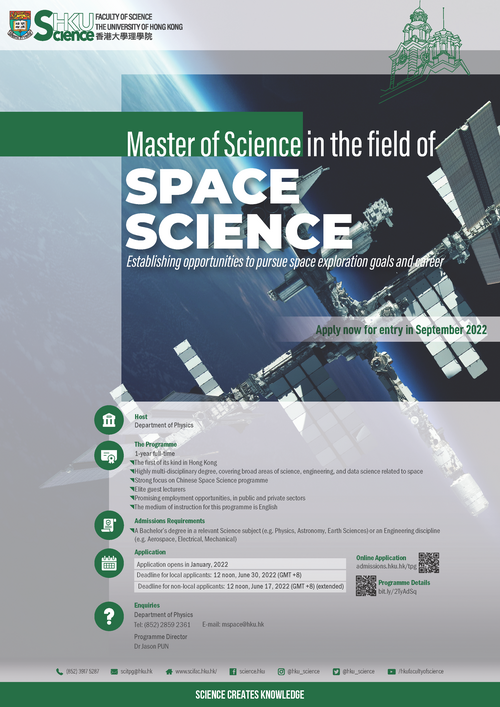This programme is not open to admission in 2025-26
The Department of Physics is offering an exciting Taught Postgraduate Master of Science in the field of Space Science. Modern Space Science is a highly multi-disciplinary field that encompasses a broad range of sub-disciplines, from astrophysics, to aerospace engineering, electronics, remote sensing, and space exploration. China has recently been investing heavily in Space Science, launching 39 satellites in 2018 alone, over twice as many as in 2017 and more than any other country in the world. Given its status as a global metropolis, its strong international links, and its location in the “Greater Bay Area” (GBA), Hong Kong is ideally placed to capitalize on the growth of China in the area of Space Science. Our programme taps into our strengths in high-energy astrophysics, planetary sciences, statistics, and engineering, while leveraging our connections with elite Mainland and global partners. Our MSc will provide a solid foundation to enter this exciting field, with promising employment opportunities both in the public and private sectors, in China and worldwide.
Admission Requirements
To be eligible for admission to the programme, you should have:
- A Bachelor's degree with honours of this University, or an equivalent qualification;
- Applicants should possess a Bachelor's degree in a relevant science subject (e.g. Physics, Astronomy, Earth Sciences) or an Engineering discipline (e.g. Aerospace, Electrical, Mechanical), or a related subject; and
- Fulfil the University Entrance Requirements.
For 2022-23 intake:
Application opens in late January 2022.
- Non-local applications deadline: 12 noon (HKT), June 17, 2022 (extended)
- Local applications deadline: 12 noon (HKT), June 30, 2022
Applications can be submitted via our on-line application system here.
For non-local students, they are advised to apply as early as possible to ensure completing all entry visa requirements prior to the commencement of the programme (It may take up to 3 months to process the entry visa).
Frequently Asked Questions (FAQ) for the Master of Science in the field of Space Science Programme
(Please read the FAQ before making an application)
Fees for 2022-23 intake:
The composition fee for the full-time programme for 2022-23 intake will be HK$210,000#. The fee shall be payable in two instalments over one year. Additional expenses for field travel and studies are possible.
In addition, students are required to pay Caution Money (HK$350, refundable on graduation subject to no claims being made) and Graduation Fee (HK$350). With effect from 2022-23, all full-time students will be charged a student activity fee of $100 per annum to provide support for activities of student societies and campus wide student events.
# Subject to approval
Programme Highlights
- English as the medium of instruction
- 1 year (full-time)
- Offered by the Department of Physics, with contributions from the Department of Earth Sciences, Department of Statistics and Actuarial Science and the Department of Electrical and Electronic Engineering
- Highly multi-disciplinary degree, converging broad areas of science, engineering, and statistics, as related to space science and technology
- Strong focus on Chinese space science programme
- Elite guest lecturers
- Promising employment opportunities, in public and private sectors
A. Programme Structure
Our MSc programme is composed of 60 credits of courses. Students must enroll in 6 courses (36 credits) of “core” (compulsory) courses, offered mainly in the first semester. Students may then choose 3 “elective” courses out of a broad range of courses spanning different disciplines and Faculties. In addition, students must carry out a “capstone project” by enrolling in the 6-credit course SPSC7031. Students are encouraged to approach faculty members in their areas of interest as soon as possible, in order to choose an appropriate project. The curriculum of the MSc in Space Science is the same for both full-time and part-time modes of study.
Remark: The 2022/23 programme structure will be reviewed from time to time and is subject to final approval.
| Master of Science in the field of Space Science | ||
|---|---|---|
| Compulsory Courses (36 credits) | ||
| SPSC7002 | Introduction to space weather (6 credits) | |
| SPSC7003 | Remote sensing in space science (6 credits) | |
| SPSC7004 |
| Radiation detection and measurement (6 credits) |
| SPSC7005 |
| Space science entrepreneurship (6 credits) |
| SPSC7007 | Data analysis in space science (6 credits) | |
| SPSC7015 |
| Introduction to planetary science (6 credits) |
| Elective Courses * (18 credits) | ||
| SPSC7006 |
| Small Satellite Design (6 credits) |
| SPSC7011 |
| Introduction to space plasma physics (6 credits) |
| SPSC7014 | Big data, AI and machine learning in space science(6 credits) | |
| STAT6016 | Spatial data analysis (6 credits) | |
| STAT7102 | Advanced statistical modelling (6 credits) | |
| ELEC6008 | Pattern Recognition and machine learning (6 credits) | |
| ELEC6026 | Digital signal processing (6 credits) | |
| ELEC6065 | Data compression (6 credits) | |
| ELEC6100 | Digital communications (6 credits) | |
| PHYS8150 | Computational physics and its contemporary applications (6 credits) | |
| PHYS8654 | General relativity (6 credits) | |
| Capstone Project (6 credits) | ||
| Space science final project (6 credits) | |
* Timetabling of courses may limit availability of some electives. The actual offering of such electives will be based on student demand.
B. Course Description
| Core Courses |
|---|
SPSC7002 Introduction to space weather (6 credits)Our modern lifestyles rely on satellite technology which can be severely affected by the Earth’s local particle environment. Much of this is due to the influence of the Sun, which emits large quantities of radiation and charged particles that interact with the Earth’s magnetic field. This course covers the fundamentals of space weather, from its origins, to its effects, and forecasting.
Assessment: coursework (50%); written examination (50%) |
SPSC7003 Remote sensing in space science (6 credits)This course introduces the theory behind, and the many practical applications of remote sensing, focusing on applications of satellite-based detectors to monitor the Earth’s environment. The course covers the physical principles of remote sensing, including the various spectral signatures in the different parts of the electromagnetic spectrum. Students will learn about the different sensor technologies, and how to characterize and quantify their performance.
Assessment: coursework (50%); written examination (50%) |
SPSC7004 Radiation detection and measurement (6 credits)This course provides an overview of various ways we detect radiation to make physical measurements in space science. It covers the fundamentals of radiation interactions and properties of radiation detectors, including some of the most commonly used ones in contemporary science missions.
Assessment: coursework (50%); written examination (50%) |
SPSC7005 Space science entrepreneurship (6 credits)No longer driven entirely by governmental institutions, developments in frontier space science in modern times also receive boosts from academia, corporations and entrepreneurs alike. Businesses like SpaceX, Blue Origin, or Virgin Galactic are not only capturing people’s imagination, but also proving that space pro- vides big business opportunities. This course will cover the basics of designing, launching, and running a business, with a special emphasis on how ventures can be started for the burgeoning space industry.
Assessment: coursework (60%); final case study and presentation (40%) |
SPSC7007 Data analysis in space science (6 credits)This course introduces concepts of data analysis in space science. Techniques ranging from traditional statistical methods to recent machine learning algorithms will be introduced. Applications of these techniques in space science will be the focus in this course for students to understand how they are actually deployed in solving practical problems in space science.
Assessment: coursework (50%); written examination (50%) |
SPSC7015 Introduction to planetary science (6 credits)We live in a golden age of planetary science, with new missions being proposed at an unprecedented rate by all the major space agencies. This course provides a modern understanding of the properties of our Solar System and planetary systems around other stars and of the physical, chemical, and geological processes that govern their motion and properties. Special attention will be paid to how our knowledge has been enriched by recent discoveries from space missions such as Cassini and Kepler.
Assessment: coursework (50%); written examination (50%) |
| Elective Courses | |
|---|---|
SPSC7006 Small satellite design (6 credits)Small satellites (sometimes referred to as microsatellites, CubeSats, etc.) are becoming increasingly popular. Once proposed mainly for educational purposes, due to their low cost and shorter development time scales, these days many such satellites are being proposed and launched with a range of cutting-edge scientific goals. Microsatellites make full use of the latest achievements in basic technologies such as modern microelectronics, micro mechanics, and advanced materials. This course covers the practical aspects of designing a small satellite, based on the principle of purchasing “off-the-shelf” components, and benefitting from “open source” solutions to many of the technical challenges. Topics include: science instruments and payloads, satellite subsystems, ground networks, space science data and software, ground networks, launchers, and operations.
Assessment: coursework (50%); written examination (50%) | |
SPSC7011 Introduction to space plasma physics (6 credits)Most of space is filled with plasma, the fourth state of matter where freely moving charges from ionized gas interact with (and generate) electric and magnetic fields, leading to a complicated set of phenomena. This course will provide an introduction to the field, covering such topics as plasma characteristics, electromagnetic waves in cold plasmas, collision theory, magnetohydrodynamics (MHD), force-free magnetic-field configurations, stochastic processes, and interaction of particles and waves. The course will emphasize some of the applications of plasma physics in the fields of geophysics and astrophysics.
Assessment: coursework (50%); written examination (50%) | |
SPSC7014 Big data, AI and machine learning in space science (6 credits)Artificial Intelligence (AI), Machine Learning and Big Data analytics are interdependent disciplines that are increasingly influential in the real world under the broad umbrella of data science. They have found widespread applications in all branches of science and technology and have direct application in space and satellite technologies. This course introduces the basics of all these areas. Data analytics is the science of analyzing raw data to make conclusions, a particular challenge in the Big data era, while machine learning (ML) is a technique enabling computers to learn without being explicitly programmed and is part of the broader concept of Artificial Intelligence (AI). Key concepts across these fields will be explored including practical processes, techniques and algorithms. There will be a focus on real-world examples with specific emphasis on applications in space and planetary sciences. The course will also cover some ML software packages in Python and R. Examples in all areas will be drawn from contemporary research in fields such as astrophysics, particle physics and complex systems, including rare source identification from vast data, training sets, smart classification, time series, imaging and spectral analyses.
Assessment: coursework (50%); written examination (50%) | |
STAT6016 Spatial data analysis (6 credits)This course covers statistical concepts and tools involved in modelling data which are correlated in space. Applications can be found in many fields including epidemiology and public health, environmental sciences and ecology, economics and others. Covered topics include: (1) Outline of three types of spatial data: point-level (geostatistical), areal (lattice), and spatial point process. (2) Model-based geostatistics: covariance functions and the variogram; spatial trends and directional effects; intrinsic models; estimation by curve fitting or by maximum likelihood; spatial prediction by least squares, by simple and ordinary kriging, by trans-Gaussian kriging. (3) Areal data models: introduction to Markov random fields; conditional, intrinsic, and simultaneous autoregressive (CAR, IAR, and SAR) models. (4) Hierarchical modelling for univariate spatial response data, including Bayesian kriging and lattice modelling. (5) Introduction to simple spatial point processes and spatio-temporal models. Real data analysis examples will be provided with dedicated R packages such as geoR.
Assessment: coursework (50%); written examination (50%) | |
STAT7102 Advanced statistical modelling (6 credits)This course introduces modern methods for constructing and evaluating statistical models and their implementation using popular computing software, such as R or Python. It will cover both the underlying principles of each modelling approach and the model estimation procedures. Topics from: (i) Linear regression models; (ii) Generalized linear models; (iii) Model selection and regularization; (iv) Kernel and local polynomial regression; selection of smoothing parameters; (v) Generalized additive models; (vi) Hidden Markov models and Bayesian networks.
Assessment: coursework (50%); written examination (50%) | |
ELEC6008 Pattern recognition and machine learning (6 credits)This course aims at providing fundamental knowledge on the principles and techniques of pattern recognition and machine learning. Specifically, the course covers the following topics: Bayes decision theory; parametric and non-parametric methods; linear discriminant functions; unsupervised learning and clustering; feature extraction; neural networks; context-dependent classification; case studies.
Pre-requisite: A good background in linear algebra, programming experience. Mutually exclusive with: COMP7504 Pattern recognition and applications.
Assessment: coursework (30%); written examination (70%) | |
ELEC6026 Digital signal processing (6 credits)This course provides an introduction to the fundamental concepts of digital signal processing (DSP) including a wide variety of topics such as discrete-time linear time invariant systems, sampling theorem, z-transform, discrete-time/discrete Fourier transform, and digital filter design. Furthermore, the course will also discuss in detail about other advanced topics in digital signal processing such as multidimensional signals and systems, random processes and applications, and adaptive signal processing.
Assessment: coursework (30%); written examination (70%) | |
ELEC6065 Data compression (6 credits)This course provides an introduction to the state-of-the-art compression techniques for typical media including files, digital images, videos and audios. Specifically, the course will discuss in detail about the coding and quantization techniques commonly used for images, videos and audios. Finally, the course will cover basic concept and terminologies of common image, video and audio standards.
Assessment: coursework (30%); written examination (70%) | |
ELEC6100 Digital communications (6 credits)This course aims at enabling the fundamental understanding of the digital communication systems. After an overview on basic probability and random processes, the course will cover the modulation and demodulation. Then, performance analyses under additive white Gaussian noise channel and fading channel are examined. This is followed by topics on spatial diversity and channel equalization.
Mutually exclusive with: ELEC6014 and ELEC6045
Assessment: coursework (40%); written examination (60%) | |
PHYS8150 Computational physics and its contemporary applications (6 credits)This course shows the power of computational approach to solving physics and related problems, which is complimentary to the traditional experimental and theoretical approaches. Students are expected to spend a significant fraction of time in actual programming. Topics include: Introduction to computational physics; ordinary differential equation for classical physical problems; partial differential equation for classical and quantum problems; matrix method and exactly diagonalization for classical and quantum problems; Monte Carlo methods for statistical physics and quantum many-body physics; numerical methods for phase transitions and machine learning approaches to physics problems.
Assessment: coursework (70%); written examination (30%) | |
PHYS8654 General relativity (6 credits)This course serves as a graduate level introduction to general relativity. It provides conceptual skills and analytical tools necessary for astrophysical and cosmological applications of the theory. Topics include: The principle of equivalence; inertial observers in a curved space-time; vectors and tensors; parallel transport and covariant differentiation; the Riemann tensor; the stress-energy tensor; the Einstein gravitational field equations; the Schwarzschild solution; black holes; gravitational waves detected by LIGO, and Freidmann equation.
Assessment: coursework (50%); written examination (50%) |
| Capstone Project |
|---|
SPSC7031 Space science final project (6 credits) [Capstone project]Students must carry out a research project in any aspect of space science under the guidance of a faculty member from the MSc in Space Science program. Students are encouraged to approach faculty members in their areas of interest as soon as possible, in order to choose an appropriate project. Students may either propose a topic of interest, participate in any existing projects of the faculty member, or else they will be assigned a project after consultation with the course coordinator. An oral presentation is required and a written report must be submitted.
Assessment: oral presentation (25%); written report (75%) |
Programme Director
Dr Jason C S Pun
Department of Physics
Dr Jason Chun Shing Pun is a researcher in the field of space astrophysics who specializes in the studies of supernovae, supernova remnants and X-ray binaries. He is also involved in the research in neutrino physics and cosmic-rays. Recently he has started research work on using remote sensing data from satellites to study impact of artificial light on our night sky. Dr Pun is a co-recipient of the 2016 Breakthrough Prize in Fundamental Physics and he was also awarded the 2018 Dark Sky Defender Award by the International Dark-Sky Association.
Staff List
The University of Hong Kong | Zhejiang University |
|---|---|
|
Nanjing University
Other
|
Graduate/ Student Sharing
FOO Xiang Feng
Class of July 2022
WANG Tiantong Seren
Class of July 2022

Kees de KUIJPER
BSc Major in Astronomy, Leiden University
"This MSc programme fits me naturally as I would like to pursue a career in the highly-exciting and fast-growing space industry. The many capstone projects offered provide unique experiences ranging from the fundamental scientific aspects to topics of practical applications to help students to get in touch with the space industry, which can even lead to internship positions."

YAO Yingjie Alison
BSc Major in Geographic Information Science, China University of Geoscience
"Through this programme, I found space to be closely related to our life. We learnt the science behind the beautiful phenomena, along with the technical skills to process and analyze the data collected. The course on ‘astropreneurship’ really broadens my horizon and deepens my understanding of the commercial prospect of space. All in all, this programme is interesting, informative, and has helped me to gain an entirely fresh perspective of this exciting field."
Enquiries
Dr J C S Pun Programme Director Department of Physics
| Department of Physics The University of Hong Kong
| Faculty of Science The University of Hong Kong
|




